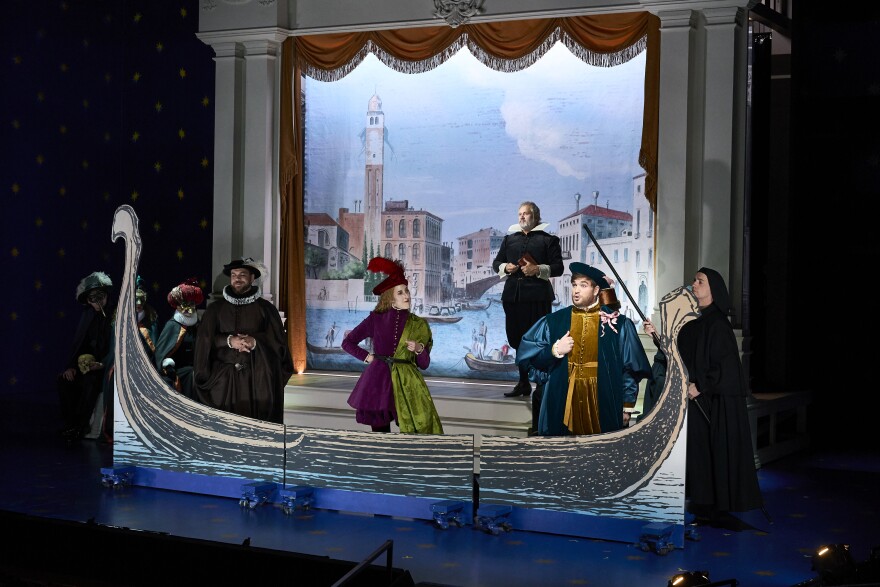In 17th century Italy, Galileo Galilei pointed his telescope at the sky and discovered a truth that threatened his life: the Earth revolves around the sun.
The reality of a heliocentric solar system conflicted with the teachings of the Roman Catholic Church, which viewed the earth as the center of the universe. The Church declared the astronomer’s truth-telling to be heresy, punishable by death.
Composer Philip Glass’ opera “Galileo Galilei” dramatizes the story of Galileo’s lifelong quest to observe and record truths about the universe, and the consequences imposed by a society determined to keep its religious dogma undisturbed by freshly discovered facts.
The production by Opera Theatre of St. Louis opening Saturday is just the second Glass work the company has tackled.
St. Louis Public Radio’s Jeremy D. Goodwin spoke with tenor Paul Groves, who sings the role of Galileo, and soprano Vanessa Becerra, who portrays Galileo’s daughter, Maria Celeste.
Groves and Becerra answered similar questions in separate interviews. Goodwin asked them about some key moments in the opera, and the special difficulty of performing Glass’ work.


Jeremy D. Goodwin: Have you performed work by Philip Glass before?
Paul Groves: I haven’t. For many years at the Metropolitan Opera, every two years or so they would do a production of a Philip Glass opera. But for some reason, in all my years there, I was never in one of those pieces. But I saw every one of them and really enjoyed them. I’m really enjoying this one because it’s a little more melodic, and it’s much more easily sung than a lot of his pieces. It really lets the voices shine a little more than some of his other pieces which have large vocal ranges and a lot of large leaps.
Vanessa Becerra: This is actually my third Philip Glass opera. I am so close to being a specialist but maybe I need one more after this. I love Philip Glass. It was sort of a homecoming to hear his accompaniment and it’s so familiar. The soundscape is something I really enjoy.
He has this amazing ability to get you into a trance, sort of this hypnotic zone. Because it’s so hypnotic and trance-like, it’s easy to lose your spot and not know if you’re on the third beat or the first beat. You have to just ride the wave. Hop on and hold on tight there are a lot of composers who will set text to sound as natural and conversational as possible. And Philip Glass seems to look at that idea and scoff at it.


Goodwin: What about your character do you find particularly interesting?
Becerra: For the most part, I'm singing Maria Celestia, who is Galileo Galilei's daughter, but I also have a little cameo as someone else in the final scene. She was gifted and he saw that.
I really enjoy the dynamic that she has with her father, because she's stuck. She's not supposed to be this learned, ambitious person who is eager to pursue other ideas. She's a woman in an era where you have two options, you're gonna get married or be in the Church. I find it so important and really beautiful and tender that Galileo saw that she was so naturally gifted, and he loved fostering that.
In her letters to him, she reminds him he’s going to be OK. There’s a bit of a role reversal, where as his daughter she is comforting him because she knows that he’s being slandered, he’s being criticized, his character is being challenged. I appreciate the fact that she’s a source of comfort and hope and inspiration for him.
Groves: Since I'm almost 60 years old, there are a lot of things in my life that I regret doing. And we all have those as we get older.You think, if I would have just gone in this different direction, maybe life would have been a little easier for me. If I wouldn't have been so adamant about what I believed in, maybe life would have been a little easier for me.
And that's actually what Galileo went through. The thinking of the time was that the earth was the center of the universe and the sun and everything else revolved around us. It was heresy to say that we travel around the sun. The penalty for this heresy against the Church was death. And of course, he didn't want to die. So he recanted everything.


Goodwin: What does this story have to say to us in 2024?
Becerra: That two things can be true at the same time. Personally, I believe in God. I am a Christian. And that doesn't stop me from ingesting information and reading and being educated and saying, ‘Hmm, this might challenge that idea.’ That's how we continue to learn and thrive and develop. It’s OK. It's not as scary as people like to make it seem.
Groves: Twenty or 30 years ago, I wouldn’t have thought this. But we do have a lot of people that are doubting science and scientists these days. Not even just the COVID-19 think we just went through, which was devastating for the arts community, of course. But even before that, we have people now believing that the Earth is only 6,000 years old. We have a big faction of people that don’t believe we landed on the moon.
I’m a big believer in science. I know a lot of scientists. Some of my best friends are scientists. None of those people have ulterior motives about what science would bring them. They just want the truth. And I really believe that science brings us the truth.
Just like Galileo. He knew what he said was true.






![Julia Bullock and Davóne Tines in "Fire Shut Up in My Bones." [6/14/19]](https://npr.brightspotcdn.com/dims4/default/66a1c70/2147483647/strip/true/crop/7000x4631+0+18/resize/130x86!/quality/90/?url=http%3A%2F%2Fnpr-brightspot.s3.amazonaws.com%2Flegacy%2Fsites%2Fkwmu%2Ffiles%2F201906%2Fjulia_bullock_and_dav__ne_tines_in_fire_shut_up_in_my_bones__2019_._photo____eric_woolsey.jpg)